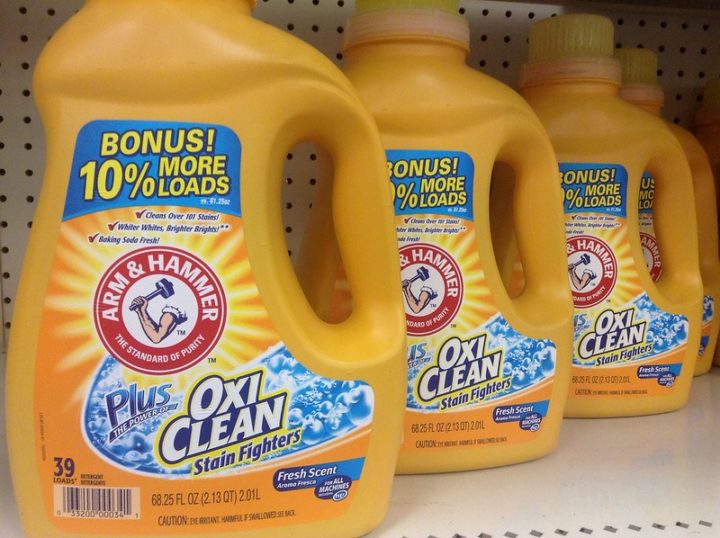
Ever since couponing slumped with the onset of the coronavirus pandemic last year, the coupon industry has been saying it’s more important than ever for brands to start ramping up their coupon offerings again. But it appears that some brands may not have gotten the message.
Arm & Hammer detergent is a discount brand that, not too long ago, you could almost always buy on sale with a coupon. But as it stands now, there hasn’t been an insert or a printable coupon for Arm & Hammer detergent since late January.
And Church & Dwight, the detergent’s manufacturer, says – get used to it.
“We have announced price increases in laundry and across our international portfolio, and we have reduced couponing and promotional spending,” Church & Dwight CEO Matthew Farrell told investors last week.
And his company isn’t the only one cutting back on the deals. Right now “there’s little incentive to put a bunch of deep discounting out in the system,” Clorox CEO Linda Rendle said last week. “The overall sentiment would be, keeping it as rational as we can and using promotion for what it’s intended for – to drive trial.” Kimberly-Clark, which makes brands like Kleenex, Huggies and Cottonelle, is rethinking its marketing strategies as well. “We want to be competitive on price or promotions, but I don’t think promotions in a fixed consumption category are the right long-term way to grow,” Kimberly-Clark CEO Michael Hsu told investors recently. “It’s different than, let’s say, an impulse category like cookies, where you can drive incremental consumption through promotion. Our categories, you generally don’t drive incremental consumption.”
And their comments come as everyone from Procter & Gamble to General Mills have said they’re going to be forced to raise prices, to offset higher commodity costs.
But Church & Dwight is the only one to mention cutting back on coupons specifically. And you’ve got to at least give them credit for transparency. “Our competitors have taken price in a different way, generally through changes in ounces,” Farrell said, referring to some manufacturers’ sneaky way of raising prices without actually raising prices, by shrinking package sizes instead, to trick you into thinking you’re not paying more. Church & Dwight, in contrast, plans to raise prices by just plain raising prices, and cutting back on the discounts.
If it seems like a terrible time to be raising prices and reducing deals, it kind of is – but to many brands, it may also be the perfect time.
This time last year, our couponing and deal-seeking routines went out the window, as shoppers focused on stockpiling and getting what they needed regardless of price, while retailers and brands prioritized keeping the shelves stocked over promoting their products. Most figured that once supply and demand returned to normal, coupons and deals would as well.
In many ways, though, we’re still waiting for that to happen. Coupon distribution and redemption hit historically-low levels last year, and they still haven’t bounced back. And according to the most recent figures released by Nielsen, 28.6% of all grocery and household products are now sold on promotion, which is well above last May’s low of just 18%, but still below the average of 31.5%.
That’s not good news for those who’ve been hit hard economically during the pandemic. So instead of waiting for coupons and discounts to return, many cash-strapped shoppers who might otherwise rely on deals have been shifting more of their shopping to dollar stores, or retailers offering everyday low prices like Walmart or ALDI.
Less price-sensitive shoppers, in contrast, may simply have gotten used to paying more. For everyone who’s struggling financially, there are others who are doing pretty well. With government stimulus funds, along with cash not spent on vacations or concerts or in restaurants, “people have the means to buy,” Gregory Daco, chief U.S. economist for the firm Oxford Economics, told the New York Times. So why would sellers want to retrain these full-price buyers to start looking for deals again? “Even if you raise your prices, you’re not necessarily going to lose market share,” Daco said, “because most other producers are doing the same thing.”
Typically, in troubled economic times, coupons and sales become more popular. During the last recession in 2009, Nielsen reported that a whopping 42% of all grocery items were sold on promotion. And coupon use hit an all-time high during the recession of the early 1990’s. But what we’ve been experiencing this past year has been anything but a typical recession. If more consumers have already shown they’re willing to pay more, more manufacturers are willing to let them.
So the next time you need to buy detergent, keep a close eye on the package size and the price-per-ounce, to make sure you’re not experiencing a sneaky price hike in the form of a smaller container. If you buy Arm & Hammer detergent, at least you won’t have to worry about shrinking bottles. But if you see a coupon – better grab it, while you can.















